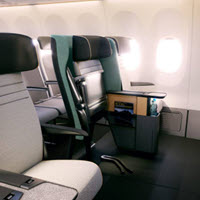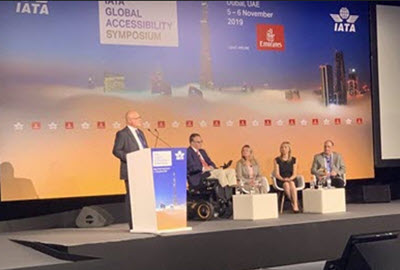EU Commission, IATA, Easyjet view on New Accessibility Ideas
- Written by Roberto Castiglioni
 Following the presentation of the Air4All concept, Reduced Mobility Rights have spoken with the EU Commission, IATA, and Easyjet on air travel accessibility solutions.
Following the presentation of the Air4All concept, Reduced Mobility Rights have spoken with the EU Commission, IATA, and Easyjet on air travel accessibility solutions.
In 2021, flying with your own wheelchair remains a gamble. Despite the industry working hard on finding permanent solutions to this problem, the possibility of a mobility device being damaged by ground handlers or during a flight is still present.
Whilst damage is cause for concern, the aftermath can be far more serious. Last November, disability activist Engracia Figueroa, 51, was given a replacement wheelchair by an airline after her own bespoke mobility device had been damaged beyond repair during a flight. The replacement was unsuitable for the campaigner’s needs, and she sadly died after developing a fatal infection. Investigation into the case leading to the death of the disability rights campaigner is ongoing.
For some, having to part with their own wheelchair is problematic enough to put them off flying altogether. For this segment of would-be fliers, a solution may be in sight.
Last October, PriestmanGoode, Flying Disabled, and SWS Certification unveiled Air 4 All, an accessibility concept aiming to revolutionize air travel for passengers by enabling powered wheelchair users to remain in their own wheelchair for the duration of the flight.
Following the unveiling of this new concept, we have spoken with several lawmakers, regulators, and stakeholders on the future of accessibility in air travel.
Understandably, none of the stakeholders directly endorsed a particular concept, but the overall view on future developments is more than positive.
“The European Commission welcomes new inventions and other industry initiatives which allow for persons with disability or with reduced mobility to use air transport in a safe and dignified manner,” a spokesperson for the EU Commission told us.
IATA, the global airlines’ trade association, further elaborated on the subject of wheelchairs in cabins, consultation, and safe transport of mobility devices.
“ IATA is committed to providing freedom to fly to all passengers. We think there is the value of exploring further the concept around the feasibility of wheelchair securement and restraint systems in the passenger cabin. However, there are many factors to consider to get it right for our passengers who are wheelchair users, but also right and safe for other passengers and as operationally and economically viable as possible for the industry,” a spokesperson for IATA told us.
“The issue of accessible air travel should be considered from a holistic perspective and for all forms of disability. For example, IATA does robust work on accessibility and has extensive partnerships with many disability groups and forward-thinking regulators, including the EU and ICAO.
accessibility and has extensive partnerships with many disability groups and forward-thinking regulators, including the EU and ICAO.
On mobility aids, we are addressing concrete and immediate solutions to avoid damage during transport. For example, we are assessing the issue around the safe transport of mobility aids in the cargo hold through the Mobility Aids action group that includes the whole travel chain and mostly the disability associations.”
The same positive outlook came from one of Europe’s largest low-cost carriers. “At easyJet we want travel to be accessible for everyone so we welcome safe and practical ways to make travel simpler and more comfortable for everyone so will continue to follow developments and concepts in this area,” a spokesperson for the budget airline said.
Whether or not the Air 4 All concept succeeds, they sure deserve credit for breaking the ice and proving that flying in your own wheelchair is not just a dream.










